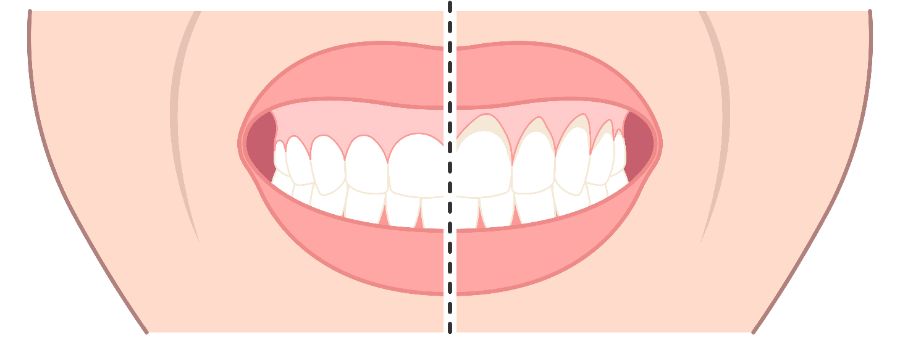5 Early Signs of Gum Disease
So how can you tell if you might be developing this condition, also known as gingivitis, and what can you do to prevent it from worsening and developing into periodontitis? Let’s explore these two conditions and identify the early signs to watch for.

Gingivitis vs Periodontitis
Gingivitis is a milder form of gum disease characterised by inflammation of the gums. It can cause your gums to bleed easily when you brush or floss your teeth, and, when caught in the early stages, it’s usually reversible with good oral hygiene habits and regular professional cleanings.
If left untreated, however, gingivitis can progress into periodontitis. This is a more serious form of gum disease that not only causes inflammation but also the destruction of the tissues and bone that support your teeth. Periodontitis can lead to tooth loss if it’s not treated early and effectively.
So how can you tell if you might have gingivitis? Here are five early signs to watch for:
Bleeding Gum
If you experience bleeding when brushing or flossing your teeth, this can be indicative of gum disease. Because the gums are inflamed and more sensitive than usual, they bleed more easily, and this is one of the most common symptoms of gingivitis. Beedling is usually the first sign that something is wrong, so it’s essential to pay attention if it happens and take swift action to book a dental appointment.

Gum Recession
Another common symptom of gum disease is receding gums. This happens when the surrounding gum tissue starts to pull away from the teeth, exposing more of the tooth root and giving the appearance of longer teeth. Any recession of the gum can also lead to tooth sensitivity and an increased risk of cavities.

Sore, Tender, or Itchy Gums
Do your gums feel especially sensitive? Are they often red and inflamed? Do they itch? These can all be signs of gum disease and should be taken seriously. If you’re experiencing any of these symptoms, see your dentist ASAP.

Pain when you chew
If you find that your teeth are starting to hurt when you eat or chew, it’s likely because the inflammation in your gums is causing pressure on the tooth roots. This can lead to serious dental problems if left untreated, so be sure to see a dentist immediately if you’re experiencing any pain when you chew. While it could indicate a cavity or other issue, it’s known to be one of the early warning signs of gum disease.

Bad Breath
No one wants to be told their breath smells, and so if you find you have bad breath even after brushing your teeth and tongue, this could be a sign of gum disease. When plaque and tartar build-up on the teeth and gums, the bacteria can cause bad breath (halitosis), which is unpleasant for everyone. If you’ve noticed that your breath isn’t as fresh as it used to be, make an appointment with your dentist.

Notice any of the above? Here’s what to do…
With any of these early signs of gum disease, getting treatment sooner greatly reduces the risk of further deterioration.
If you’re experiencing any of these or have any questions, contact us on 07 3382 7500 or via the form below to make an appointment. We’re here to help, so please don’t hesitate to get in touch if you have any questions or concerns about your oral health.
